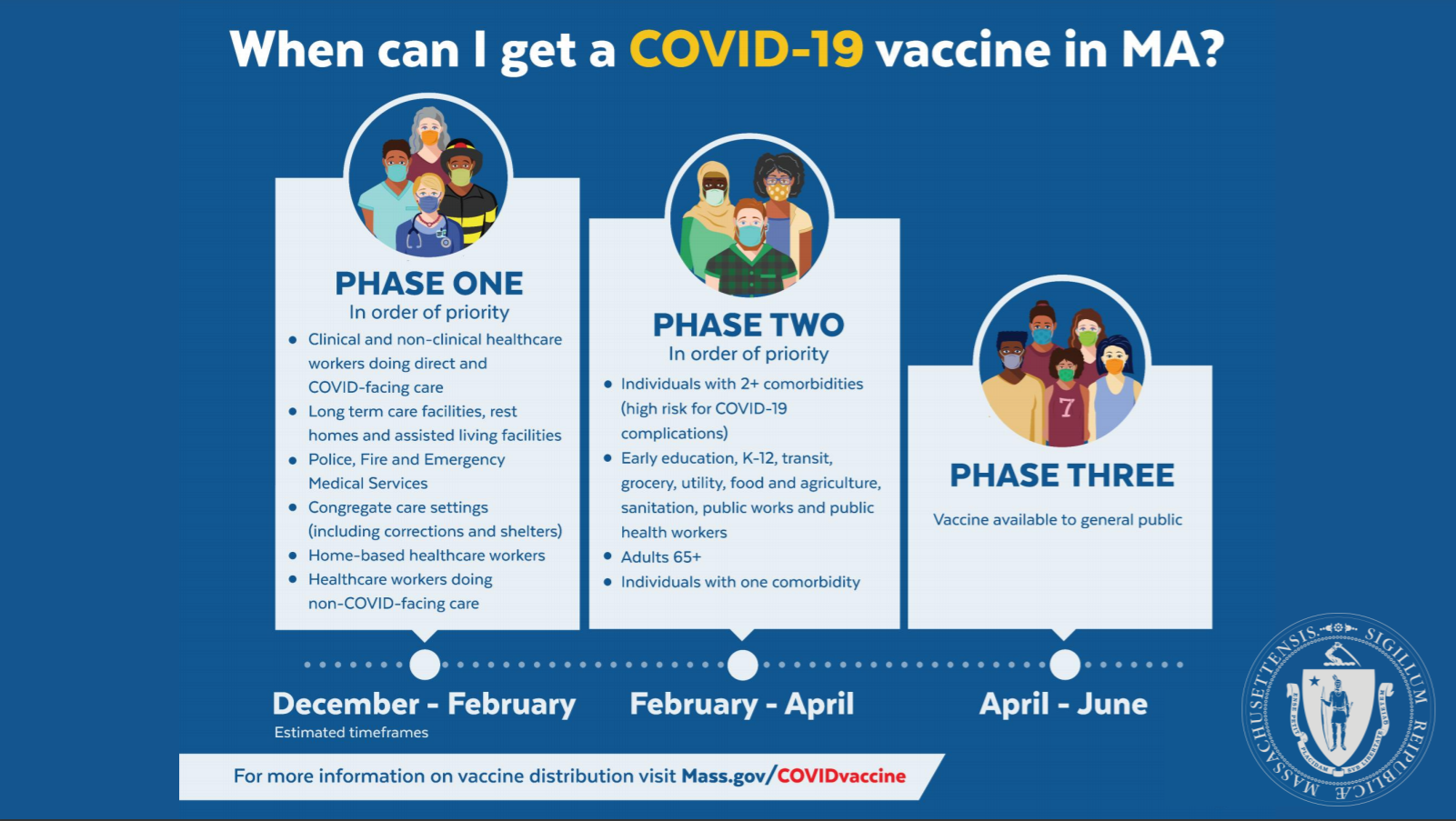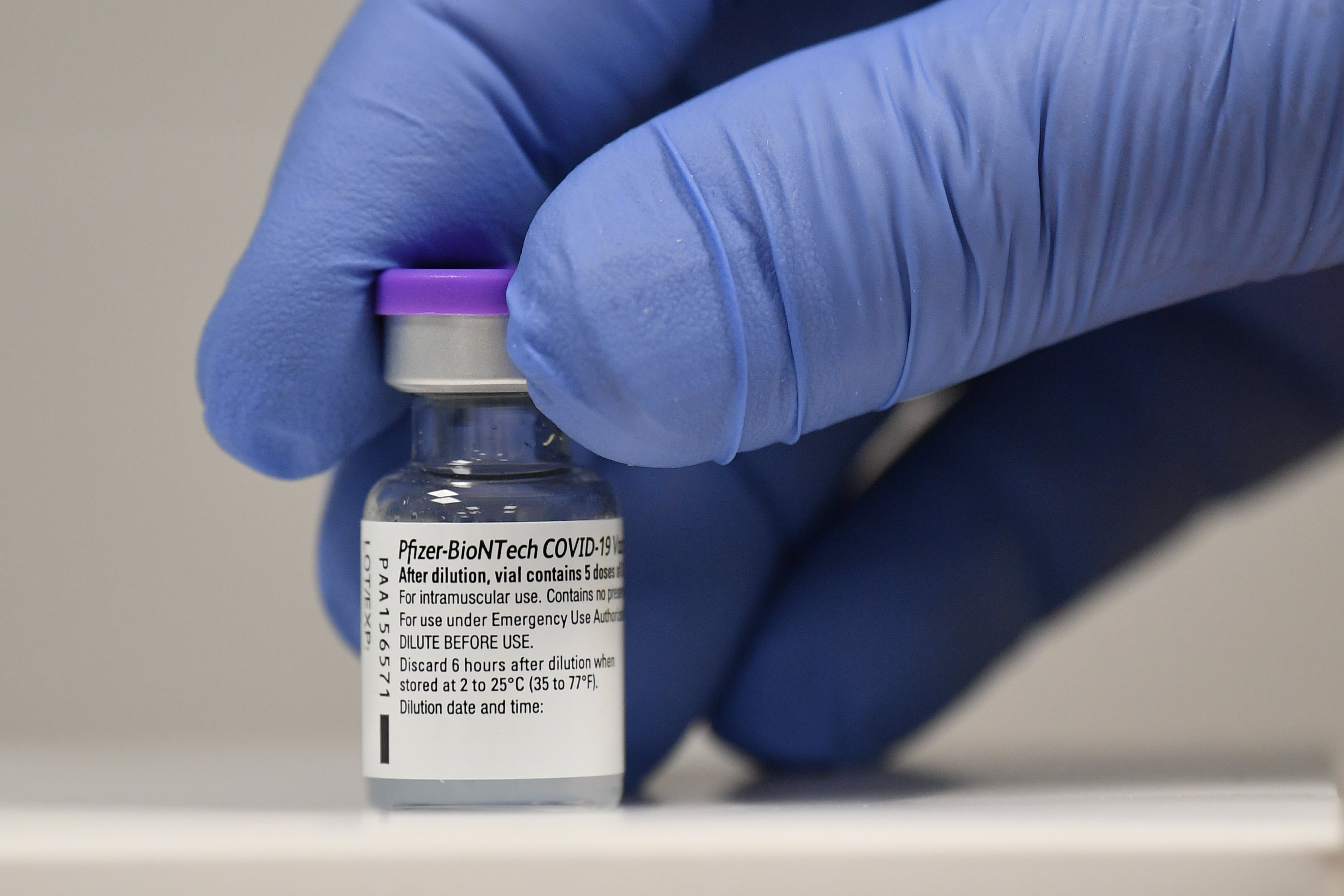The plan for distributing coronavirus vaccines across Massachusetts are now being put into motion following the U.S. Food and Drug Administration's emergency use approval of Pfizer's COVID-19 vaccine.
Gov. Charlie Baker announced Wednesday that the state's distribution will occur in three phases and is expected to start before the end of the month.
The first group will include healthcare workers, people in long-term care, and first responders, as well as inmates at correctional facilities.
The second phase will likely begin in February and targets those with underlying health problems, people over the age of 65 and essential workers like grocery store employees and teachers.
Phase three is for everyone else and is set to start in April.
Dr. Katrina Armstrong, physician-in-chief at Massachusetts General Hospital, says one thing to keep in mind is that social distancing rules will not go away immediately, even with vaccines being distributed both in the commonwealth and nationally.
“I think for the near future, the recommendations are going to be even when vaccinated that you should stay masked in large part because we’re not sure whether somebody could still spread virus," she said. "I’m a betting woman so I’m going to bet that everybody will have hung up their mask by June first.”
Massachusetts plans to receive and distribute about 2 million doses of the vaccine by the end of March. The state does not plan to mandate that people get vaccinated, however.
SHIPMENT
The state’s first shipment of 59,475 doses of the Pfizer vaccine was ordered from the federal government last Friday and will be delivered beginning Dec. 15 directly to 21 hospitals across eight counties, as well as to the state Department of Public Health Immunization lab.
Doses will then be redistributed for access to 74 hospitals across all 14 counties for front line medical workers. The next 40,000 doses of Pfizer vaccine will be allocated to the Federal Pharmacy Program to begin vaccinating staff and residents of skilled nursing facilities, rest homes and assisted living residences.
"Vaccine will be distributed in phases, starting with our highest risk and highest need individuals," Baker said.
The governor added that vaccine distribution will be a long process that plays out over several months, and the timelines could change based on production. Here's what to know:
FIRST PHASE
Phase one will run from December to mid-February, offering vaccines in descending order of priority to health care workers, long-term care facilities, first responders, congregate care settings including both shelters and correctional facilities, home-based health care workers and health care workers who do not interact directly with COVID care.
MASS. VACCINE DETAILS: Governor's Plan on Who Will Get It and When
Vaccine is being prioritized for these groups to maximize life preservation and to support the health care system. Based on information at this time, the state said it is expecting 300,000 first doses of the vaccine to be delivered by the end of December. The first vaccines, manufactured by Moderna and Pfizer, will require two doses administered three to four weeks apart.
While all delivery dates and quantities are subject to change due to ongoing federal approval and allocation, the state plans to receive and distribute over 2 million doses to priority population groups by the end of March.
SECOND PHASE
If the first phase goes according to plan, Baker said phase two will start sometime in February. In phase two, adults with two or more comorbidities that create risks for COVID-19 complications would be first in line, followed by workers in fields such as transit, education, and grocery stores, then adults 65 years old and older and individuals with just one comorbidity.
THIRD PHASE
The third and final phase is aimed to start in mid-April, when the vaccine would be available to everyone else in Massachusetts.
"It will take a while before we see any impact," said Dr. Sara Suliman, who specializes in infectious diseases at Brigham and Women's Hospital. "Hopefully, that doesn't deter people from taking it."
WILL PEOPLE GET IT?
A new poll shows most Massachusetts residents are willing to take a COVID-19 vaccine, but many want to wait for others to go first.
Overall, 36% of respondents to the MassINC Polling Group survey said they plan to take the vaccine right away, while 47% say they will wait until after either a few or many people have taken it.
Seven percent of respondents said they will never take the vaccines, which are nearing their final approvals with rollouts expected to occur over several months due to supply constraints.
The results, according the poll sponsors at the Museum of Science, also highlight important racial differences, with 38% of white residents saying they will take the vaccine "as soon as possible," compared to 28% of Black residents and 22% of Latinx residents.
Claire Pierre, a practitioner with the health center, says communication is key.
"The first thing we need to do is respect the person's autonomy and to make sure that we give them the right information they need to make an informed decision,” she said. "Listening to our communities. Making sure we understand what it means for someone who’s excited about it and what it means for someone who’s concerned about it.”
"This is incredible -- not just for COVID, but for infectious diseases in general," said Suliman. "We got the sequence of the virus in January this year, it's not even the end of the year and we already have a vaccine that's undergoing authorization. I think the biggest hurdle we'll be facing is vaccine hesitancy."
More Coverage on Coronavirus in Mass.
State House News Service contributed to this report.



